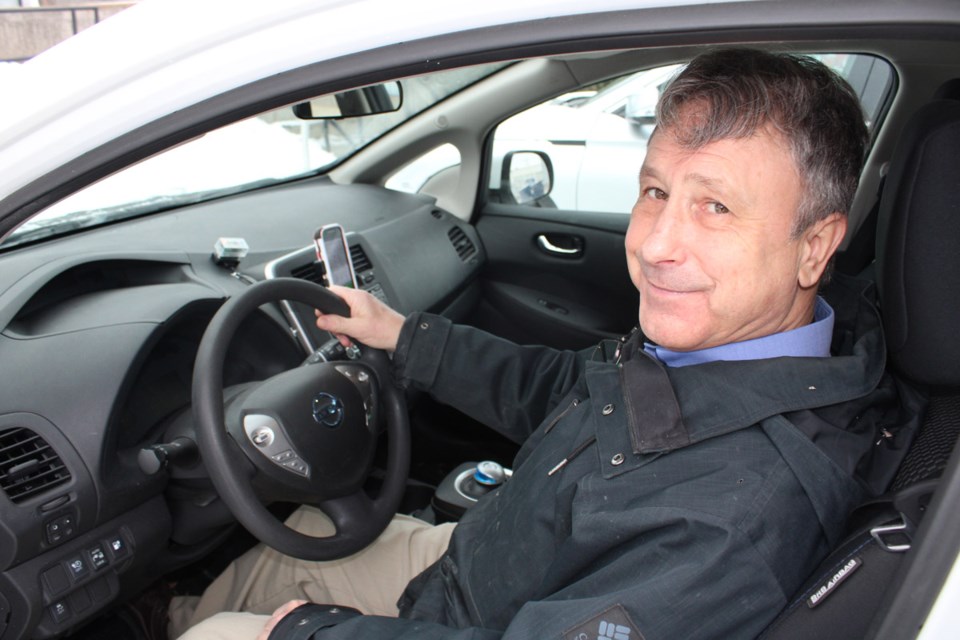Prince George Electric Vehicle Association member Doug Beckett commutes from Beaverly to downtown Prince George each day in his 2016 Nissan Leaf electric car.
The Leaf, which he bought second-hand in 2020 for about $9,000, has no problem making the 24 km drive each way, even in the cold, Beckett said. Charging the vehicle at home, he estimates he’s already saved $5,000 in fuel plus the cost of oil changes, compared to driving a gas-powered car.
“Yes, the lithium-ion batteries have a reduction in range in the cold. (But) the batteries have a heater in them, like a block heater. If you have a charge on the battery, it uses that to keep the battery warm. If you are plugged in, it uses electricity from the grid,” Beckett said. “I call it a range of 100 km. I get more than that in the summer, and a little less in the winter.”
The batteries warm up to operating temperatures when you’re driving or while they’re charging, he added.
While older electric vehicles could lose 40 to 50 per cent of their range in the winter, he said, the newer generation of vehicles use technology, like heating the cabin with heat pumps, to minimize the range loss.
In December 2021, when temperatures reached roughly -40 C, Beckett had to drive his daughter to go check a neighbour’s house in Beaverly.
“One push of the button (and) it was going. And 30 seconds later we had heat coming out of the vents and the heated seats were warming up,” he said.
The Nissan Leaf is a two-wheel drive, compact hatchback car. But for a small vehicle, it handles winter road conditions well, he said.
“The battery is… under your feet. So it’s a low centre of gravity,” Beckett said. “With the regenerative breaking, it’s like gearing down a standard (transmission vehicle.) You don’t slide all over the place the same way some gasoline cars do.”
Beckett’s nearly nine-year-old Leaf has 75,000 km on it, and the battery is still at more than 91 per cent functionality, he said.
“I’ll probably get 400,000 km from the existing battery,” he said. “That’s with old tech, with the worst battery-management technology.”
CITIZEN TEST DRIVE
Beckett allowed Citizen reporters Arthur Williams and Ted Clarke to take his Leaf for a short test drive.
The Leaf is no Tesla. It doesn’t have the push-you-back-in-your-seat acceleration Tesla owners love to show off – especially when driving in Eco mode, which tames the still-peppy acceleration.
But with the 2023 Nissan Leaf starting at $40,248 in Canada, before taxes and fees, the Leaf isn’t trying to compete in the same luxury market the Tesla is. New Leafs are eligible for up to $9,000 in provincial and federal rebates, and have an all-electric range of approximately 240 km for the base model and up to 340 km for upgraded models.
Still, the Leaf had no problem smoothly accelerating to more than 90 km/h uphill with two grown men inside. Even while accelerating, the ride is pleasantly quiet, stable and smooth – especially for a compact car.
The regenerative breaking provided nice, smooth deceleration when going downhill. It did slide a little bit, coming to a stop on the slippery back streets around the Citizen office, but no more than any other comparable car. Even when sliding, the Leaf felt grounded and stable, thanks to the low centre of gravity.
Overall, it’s a car. As a daily driver and grocery-getter, it would meet most family's needs well. And no more waiting in the Costco gas bar lineup to save a few cents a litre on gas. Charging his Leaf at home is comparable to paying $0.25 per litre for gas, Beckett said.
The short range would necessitate frequent recharging stops on a longer road trip, but for a two-vehicle family or people who don't road trip often, that would be a rare inconvenience.
People who want to take their EV on the highway regularly would want to consider investing in one of the more expensive, longer-range electric vehicles on the market.
MONTHLY MEETINGS
Prince George Electric Vehicle Association holds monthly meet-ups for electric vehicle and plug-in hybrid owners, and people curious to learn more about electric vehicles.
The free event takes place at Rivers Edge Services, 3981 18th Ave., from 6:30 p.m. to 7:30 p.m. on second Tuesday of every month. The most recent meet-up was on Tuesday.
“All electric vehicles (EVs) and plug-in hybrids (PHEVs) – cars, trucks, motor bikes, scooters, e‑bikes, snow mobiles, ATVs – are welcome to attend,” Beckett said in an email. “Connect with local electric vehicle (EV) drivers. Ask questions about going electric and even go for a test drive.”
According to Statistics Canada data, battery electric vehicles made up 11.5 per cent of new vehicles registered in B.C. and territories in the first half of 2022. Plug-in hybrids made up another three per cent.
Under B.C.’s Zero Emission Vehicles Act, the province set a target to have 30 per cent of new light-duty vehicle sales be zero emission by 2030 and will require 100 per cent of new light-duty vehicles sold in B.C to be zero emission by 2040.



